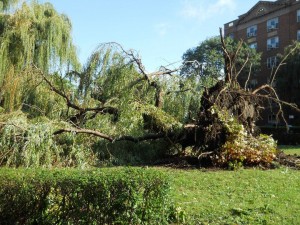 Last week a tornado ripped through parts of Queens, New York. New Yorkers aren’t exactly used to tornadoes and the event really took us by surprise. The storm passed through the neighborhood where I grew up and I still have many friends and family there. Several of them posted pictures of the storm’s aftermath on Facebook to capture the devastation.
Last week a tornado ripped through parts of Queens, New York. New Yorkers aren’t exactly used to tornadoes and the event really took us by surprise. The storm passed through the neighborhood where I grew up and I still have many friends and family there. Several of them posted pictures of the storm’s aftermath on Facebook to capture the devastation.
One friend shared a picture of a weeping willow tree that had been broken in two by the storm. This was perhaps the most moving image from the storm. There are many majestic weeping willow trees in front of various apartment buildings in Queens. Many of these trees are well over a hundred years old and I have fond memories of climbing them as a kid. It’s the type of tree that you assume can withstand anything and will be there forever.
The damaged weeping willow tree reminded me of the economic conditions of late 2008. Lehman Brothers and Merrill Lynch were a lot like that tree. They were old, established firms and for years they seemed invincible. But they weren’t. Their demise was like a tornado and the devastation was palatable. Overnight people who thought their jobs were secure had no job to speak of. And what happened at Lehman Brothers and Merrill Lynch had a ripple effect on the rest of the economy and many are still feeling that impact two years later.
No job is ever really safe. Skies can be sunny one moment and pitch black the next. Being prepared for a change in the weather and a change at a company is important. Would you be prepared for a career tornado? Here are a few things to consider doing before the dark clouds set in.
- Update your resume. Even if you are happy in your current job and feel safe, it never hurts to have a current resume. With an up-to-date resume you will always be prepared should a new opportunity present itself. To get the process started, think introspectively about what you have accomplished since you last wrote your resume. Try to think of accomplishments in terms of how you did things smarter, faster, or more efficiently and how you’ve helped the organizations you’ve supported make money, save money, save time, eliminate redundancies, grow the business, or keep the business. For more resume tips, check out this free report at the bottom of our homepage, 15 Tips For Your Resume to Do List.
- Keep networking. People always ask me how long it will take them to find a new job. I generally tell them that the length of their search is frequently correlated to the quality of their network at the time they begin looking. People with strong networks always know people who are thinking about them for other opportunities. Even if you are comfortable in your current job, continue to find ways to be active in professional communities or volunteer your knowledge or time to help others. Building visibility and credibility now will help you weather the storm if the situation in your company changes suddenly down the road.
- Keep learning. It’s easy to sit back and think you have all the necessary skills and training to do your job. But if you had to change jobs, would the depth and breadth of your knowledge be strong enough to position you for other opportunities? It’s wise to think ahead and figure out ways to stay on the leading-edge of your profession so you never become obsolete.
Like the weather, there are many aspects of our careers that we can’t control. But by concentrating on the things we can control we increase the chances of quickly getting out of the eye of the storm and moving on to a brighter place.


